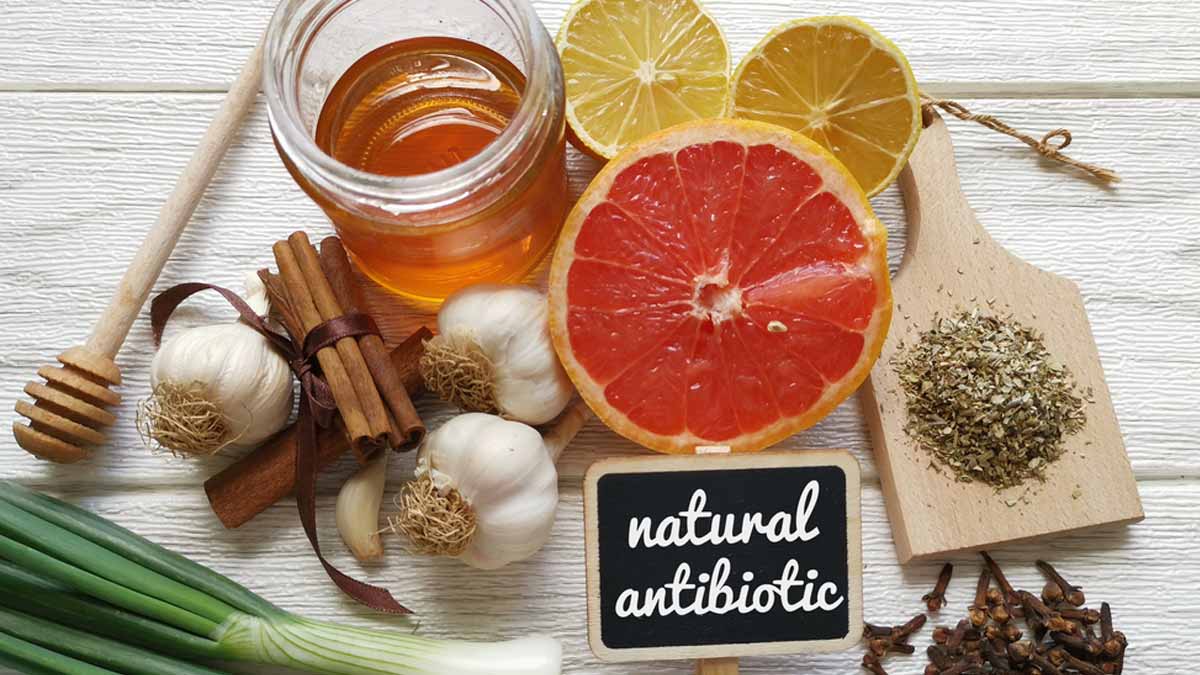
Did you know the overuse and misuse of antibiotics have contributed to the emergence of resistant strains? This highlights the use of natural antibiotics as an alternative to conventional antibiotics in the fight against bacterial infections. We spoke to our expert Dr Ganesh Chaudhary, Bachelor of Ayurvedic Medicine and Surgery (BAMS), PHC, Darbhanga, Bihar, who listed natural antibiotics that can help you combat bacterial infections.
Table of Content:-
“Natural antibiotics are substances found in nature that possess antimicrobial properties, capable of inhibiting the growth of bacteria or even killing them. Unlike conventional antibiotics, which are synthesised in laboratories, natural antibiotics are derived from plants, herbs, and other natural sources”, said Dr Chaudhary.
Natural Antibiotics To Treat Bacterial Infections

Garlic
“It is known for its potent antimicrobial properties and has been used for centuries to combat bacterial infections. Allicin, a compound found in garlic, exhibits strong antibacterial activity, making it effective against a wide range of bacteria, including antibiotic-resistant strains”, added Dr Chaudhary.
Honey
Honey possesses natural antibacterial properties attributed to its high sugar content, low pH, and the presence of antimicrobial compounds. According to the Asian Pacific Journal of Tropical Biomedicine, honey possesses antibacterial properties due to its content of hydrogen peroxide. Additionally, its high sugar content can inhibit the growth of specific bacteria.
Also Read: Antibiotic Overuse In Children: What Parents Need To Keep In Mind

Ginger
Ginger boasts antimicrobial properties that can help combat bacterial infections. Gingerol, the active compound in ginger, exhibits antibacterial activity against various pathogens, making it a valuable addition to one's diet for promoting overall health.
According to a study conducted in 2022, ginger was found to be effective in inhibiting various bacteria, including Streptococcus mutans, Enterococcus faecalis, Staphylococcus species, and Lactobacillus species.
Turmeric
Dr Chaudhary added, “Curcumin, the primary active compound in turmeric, demonstrates potent antibacterial properties. It can inhibit the growth of bacteria and help alleviate symptoms associated with bacterial infections. Adding turmeric into dishes or consuming it as a supplement may offer protective benefits against bacterial pathogens.”

Coconut Oil
Coconut oil, which is high in lauric acid, has antibacterial properties against a variety of bacteria, including forms that are resistant to antibiotics. Adding coconut oil to one's diet or using it topically may help combat bacterial infections and support overall health.
Also Read: Drinking Alcohol on Antibiotics? Expert Lists Side Effects
Practical Tips for Incorporating Natural Antibiotics
Dietary Diversity
You can include a diverse range of foods that are rich in natural antibiotics to reap their collective benefits. Add garlic, ginger, turmeric, and other antimicrobial foods to your meals regularly.
Raw Honey Consumption
You should consume raw and unprocessed honey to maximise its antimicrobial properties. Consider adding it to teas, and dressings, or consuming it on its own for both flavour and health benefits.
Herbal Teas
Try herbal teas made from antibacterial herbs like thyme, oregano, or echinacea to support immune function and combat bacterial infections.
Bottomline
Dr Chaudhary concluded, “It's essential to consult healthcare professionals for severe or persistent infections and to ensure that natural remedies complement, rather than replace, conventional medical treatments. With mindful dietary choices and an appreciation for the healing power of nature, individuals can take proactive steps towards combating bacterial infections and fostering optimal well-being.”
[Disclaimer: This article contains information provided by an expert and is for informational purposes only. Hence, we advise you to consult your expert before making any dietary changes, especially if you are dealing with any health condition.]
Also watch this video
How we keep this article up to date:
We work with experts and keep a close eye on the latest in health and wellness. Whenever there is a new research or helpful information, we update our articles with accurate and useful advice.
Current Version